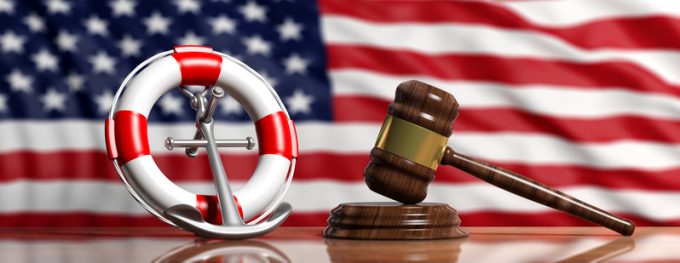White House calls on forwarders in its war on illegal fentanyl shipments
The US government has decided to address the fentanyl crisis – and has tasked freight ...

Senators yesterday introduced two more bills impacting shipping, meaning operators of large foreign vessels could have to pay the US $250bn over the next decade.
One, the International Maritime Pollution Accountability Act, aims to clean up the air around port communities, imposes a pollution fee on large vessels offloading cargo in the US.
Ships with 10,000 gross tonnage or more would face a levy of $150 per ton on the carbon emissions of the fuel burned on the inbound trip, plus fees for the nitrogen oxides ($6.30/lb), sulphur dioxide ($18/lb) and particle pollution (PM2.5) ($38.90/lb) the vessels emit
The fees will raise approximately $250bn over 10 years, providing critical funding for decarbonisation and would go toward modernising the Jones Act fleet. They would end if the IMO implemented its own, similar fees.
The other US maritime bill going before the Senate, the Clean Shipping Act of 2023, would establish a ‘baseline’ next year for greenhouse gas emission (GHG) intensity, before requiring it cut by 45% by 2030.
Under the auspices of a local air quality issue near Californian ports, if passed it would require ships calling at US gateways to begin cutting GHG emissions by 20% from 2027.
“The support of the legislation by the environmental community and the shipping industry shows that zero-emissions shipping is the future, and America should lead the way,” said California Congresswoman Nanette Barragán. “The Environmental Protection Agency must set clear standards for zero-emission fuels and port technology.”
The bill follows similar action by the European Commission, the FuelEU Maritime, three months ago, which also sets targets for the reduction of GHGs from 2025.
If it is passed by the Senate and House of Representatives, the Clean Shipping Act of 2023 would portend what has been held by shipping to be a regulatory nightmare, in which the EC, US government and China draw up their own emissions regulatory schemes, leaving International Maritime Organisation (IMO) legislation in the dust.
Like Fuel EU Maritime, the new bill takes care to refer to “lifecycle greenhouse gas emissions”, meaning it – unlike previous laws of its type – enshrines methane emissions as well as CO2. If passed, this would preclude any easy way out for vessels burning methane-leaking LNG. It would also kill the potential boom in steam-reformed ‘grey’ fuels, such as grey hydrogen, which generate CO2 in their production, even if the fuel is zero-carbon at the funnel.
California Congressman Robert Garcia said: “Not only does this bill drastically decrease shipping emissions in the United States, but it brings long-awaited justice to communities that have suffered the consequences of port pollution for far too long.”
Comment on this article